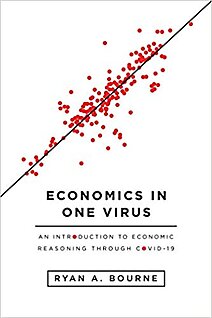In the New York Times today, columnist Ezra Klein asks himself “Is Alex Tabarrok right? Are people dying because our coronavirus response is far too conservative?” The answer is “yes.”
By “too conservative,” Klein really means “not permissive enough on medical innovation.” Tabarrok’s crusade, that Klein is now clearly sympathetic to, has focused on the idea that the U.S. regulatory state’s barriers to various forms of testing, unwillingness to adopt “first doses first” on vaccines, and failure to green-light human challenge trials, have all had extraordinary social costs, through resulting in more lost lives, liberties, and economic output than necessary.
Underlying all Tabarrok’s COVID-19 policy advocacy is the view that the pandemic’s total welfare costs are inevitably massive and so measures that end it or severely mitigate it almost always pay for themselves. Overly precautionary behavior on behalf of regulators, or else Congress focusing on relief spending rather than speeding up vaccine manufacture or distribution, therefore come with huge, unjustifiable opportunity costs.
A more interesting question than “Is Alex Tabarrok right?” then is “Why is Alex Tabarrok right?” Tabarrok has chosen the right battles as a libertarian in this pandemic because he approaches the issues using a sound economics toolkit. That willingness to apply economics to this novel scenario, and use its methods of defining counterfactuals, weighing up of costs and benefits, acknowledging trade-offs, thinking on the margin, and analyzing incentives, means he can acknowledge where the biggest gains to human welfare can be made, unencumbered by convention, politics, or culture wars.
As a result of using these frameworks, Tabarrok has led the way in advocating: the green-lighting of at-home, cheap testing; replacing lockdown regulations with “smart” reopening; using market-set prices to incentivize production of important goods and services; abandoning mutually destructive sicken-thy-neighbor trade policies; making big advanced purchase orders for vaccines; allowing vaccine human challenge trials for the young and healthy; allowing a wider spacing of vaccine doses to achieve greater communal protection sooner; and, of course, approving the AstraZeneca vaccine.
If we had adopted just a few of the policies he’s advocated, we’d have averted much suffering, and we could even now!
Alex’s work proved a deep mine of inspiration for my own book, Economics In One Virus, which is released next week and touches some of the same ground in attempting to introduce readers to economic ideas using the case study of the pandemic.
I’m delighted that Alex will be speaking at the book forum on Thursday 8th April at 12pm EDT alongside Megan McArdle, John Cochrane, and me.
—
To register for the book forum, click here. To pre-order Economics In One Virus, click here.

